David Rosen - 99 Negotiating Strategies: Tips, Tactics & Techniques Used by Wall Street’s Toughest Dealmakers
Here you can read online David Rosen - 99 Negotiating Strategies: Tips, Tactics & Techniques Used by Wall Street’s Toughest Dealmakers full text of the book (entire story) in english for free. Download pdf and epub, get meaning, cover and reviews about this ebook. year: 2016, publisher: CreateSpace Independent Publishing Platform, genre: Romance novel. Description of the work, (preface) as well as reviews are available. Best literature library LitArk.com created for fans of good reading and offers a wide selection of genres:
Romance novel
Science fiction
Adventure
Detective
Science
History
Home and family
Prose
Art
Politics
Computer
Non-fiction
Religion
Business
Children
Humor
Choose a favorite category and find really read worthwhile books. Enjoy immersion in the world of imagination, feel the emotions of the characters or learn something new for yourself, make an fascinating discovery.

- Book:99 Negotiating Strategies: Tips, Tactics & Techniques Used by Wall Street’s Toughest Dealmakers
- Author:
- Publisher:CreateSpace Independent Publishing Platform
- Genre:
- Year:2016
- Rating:4 / 5
- Favourites:Add to favourites
- Your mark:
99 Negotiating Strategies: Tips, Tactics & Techniques Used by Wall Street’s Toughest Dealmakers: summary, description and annotation
We offer to read an annotation, description, summary or preface (depends on what the author of the book "99 Negotiating Strategies: Tips, Tactics & Techniques Used by Wall Street’s Toughest Dealmakers" wrote himself). If you haven't found the necessary information about the book — write in the comments, we will try to find it.
This is the most complete catalogue of cutting-edge negotiating tactics ever published.
This blockbuster work is written as a playbook, a field guide, so lawyers, sales professionals and other dealmakers will actively use it as negotiations proceed. Use the tactics individually or in combinations. Swap them in and out as negotiations proceed for maximum effectiveness, to keep your adversary off balance, to calm them, or to close the deal. Negotiations are fluid and the mood can change. Sticking to a single approach can lead to deal failure. Rosen says a superior negotiator always adjusts as a deal progresses, just as a winning coach makes in-game adjustments.
There is no filler here. There are no war stories. This is not a biography of David Rosens career. It is exactly what the title says - an easy-to-use directory of powerful negotiating tactics.
Each technique is succinctly explained, many with useful examples. The descriptions range in length from a single paragraph to a few pages. While there are many very sophisticated principles at work in Rosens catalogue of techniques, each is simply explained. This is not an academic work. It is a tool, a device, just like a notepad, a pen or a calculator, for dealmaking pros to reference constantly.
Rosen gets high marks for his opening discussion of ethics. The tactics he compiled here are extremely powerful, and readers should use caution in deciding how to apply them. Some incorporate powerful psychological principles and are proven to work based on decades of heavy academic research. To quote Rosen from the books Authors Note, Some negotiators may find ideas in this book too aggressive, but that is a matter of perspective. It is not a matter of right versus wrong, or ethical versus unethical. One may be a principled and hardcore competitive negotiator or an unprincipled, unethical collaborative negotiator. So a given negotiators description of a tactic as too aggressive is really nothing more than his or her marking of the spot on the style continuum beyond which he or she no longer feels comfortable. Another negotiator might feel discomfort far short of that first negotiators comfort spectrum. Others still may feel no discomfort even at the extremes.
Who will benefit from this collection of advanced strategies? Lawyers, negotiators, sales organizations and sales professionals, business owners, mediators, and anyone involved in negotiating, dealmaking, selling, cold-calling, following up and closing deals.
What will you learn? A small sample of the dozens of tactics: motivating others to buy, sell or reach other agreement; overcoming objections; creating or deflating a sense of urgency; helping opposing negotiators sell your deal to their own clients; overwhelming the opposition; and strategic uses of silence and indecision.
But Rosen takes you far beyond that, and far beyond the other, generic books on the market. He introduces you to deeply-researched psychological principles, such as Prospect Theory, Coase Theorem, Asch Conformity principles and concepts like reciprocity, scarcity and consistency. Each is simply explained in a way that teaches you how to use them to achieve superior outcomes. Other books on negotiating dont even address these critical topics. Rosen explains them and shows you how they work.
Buy this guide, study it, and keep it with you. There are so many potent and compelling techniques that youll never remember them all. One things for sure, however. Once you become familiar with Rosens easy-to-understand strategies, youll never negotiate without this book again.
David Rosen: author's other books
Who wrote 99 Negotiating Strategies: Tips, Tactics & Techniques Used by Wall Street’s Toughest Dealmakers? Find out the surname, the name of the author of the book and a list of all author's works by series.



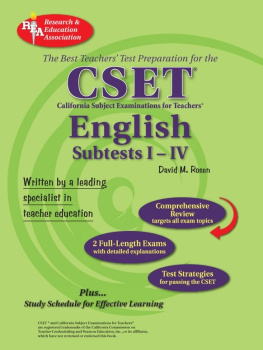



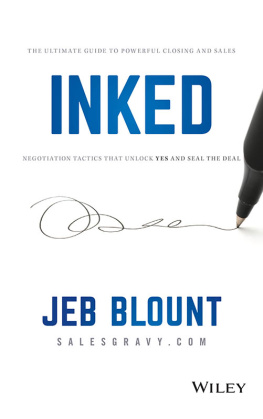

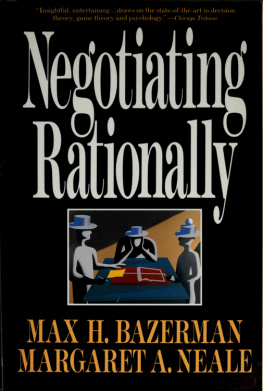
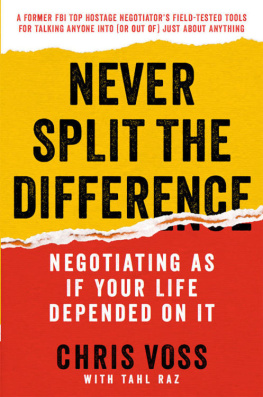
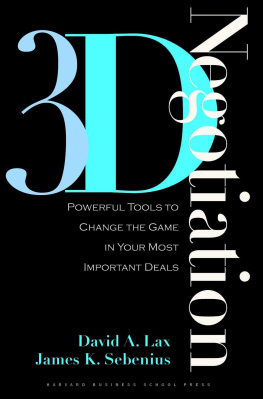
 Keep this playbook with you for every negotiation.Talk about an unfair advantage.DAN KAUFMANN, PROFESSIONAL NEGOTIATOR 99 Negotiating Strategies TIPS, TACTICS & TECHNIQUES USED BY WALLSTREETS TOUGHEST DEALMAKERSDAVID ROSEN 99 Negotiating Strategies 99 Negotiating Strategies TIPS, TACTICS & TECHNIQUES USED BY WALLSTREETS TOUGHEST DEALMAKERSDavid RosenNew York, New YorkRoss & Rubin, PublishersNew York99 Negotiating StrategiesTips, Tactics & Techniques Used by Wall Streets Toughest Dealmakers. Copyright 2016 David Rosen. Published by Ross & Rubin, Publishers, New York, New York. All rights reserved. No part of this book may be reproduced in any form without permission in writing from the publisher. ISBN-13: 9781537116945 ISBN-10: 1537116940 Disclaimer N o part of this publication may be reproduced or transmitted in any form or by any means, mechanical or electronic, including photocopying or recording, or by any information storage and retrieval system, or transmitted by email without permission in writing from the author or publisher. While all attempts have been made to verify the information provided in this publication, neither the author nor the publisher assumes any responsibility for errors, omissions or contrary interpretations of the subject matter herein.
Keep this playbook with you for every negotiation.Talk about an unfair advantage.DAN KAUFMANN, PROFESSIONAL NEGOTIATOR 99 Negotiating Strategies TIPS, TACTICS & TECHNIQUES USED BY WALLSTREETS TOUGHEST DEALMAKERSDAVID ROSEN 99 Negotiating Strategies 99 Negotiating Strategies TIPS, TACTICS & TECHNIQUES USED BY WALLSTREETS TOUGHEST DEALMAKERSDavid RosenNew York, New YorkRoss & Rubin, PublishersNew York99 Negotiating StrategiesTips, Tactics & Techniques Used by Wall Streets Toughest Dealmakers. Copyright 2016 David Rosen. Published by Ross & Rubin, Publishers, New York, New York. All rights reserved. No part of this book may be reproduced in any form without permission in writing from the publisher. ISBN-13: 9781537116945 ISBN-10: 1537116940 Disclaimer N o part of this publication may be reproduced or transmitted in any form or by any means, mechanical or electronic, including photocopying or recording, or by any information storage and retrieval system, or transmitted by email without permission in writing from the author or publisher. While all attempts have been made to verify the information provided in this publication, neither the author nor the publisher assumes any responsibility for errors, omissions or contrary interpretations of the subject matter herein.